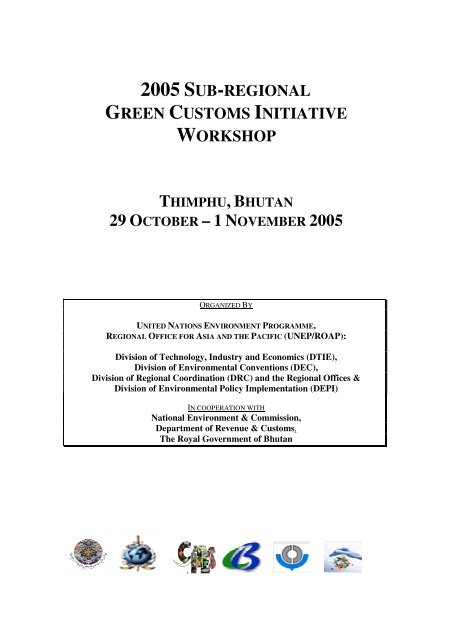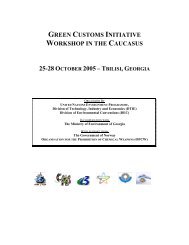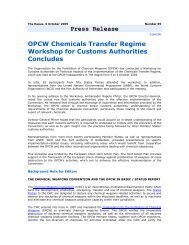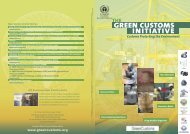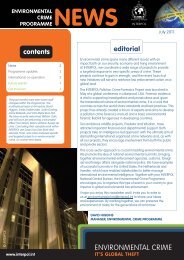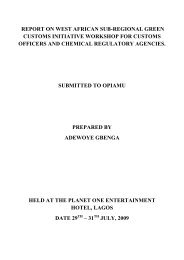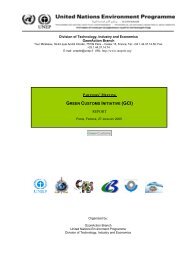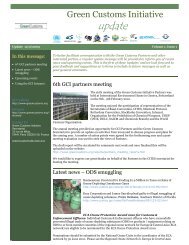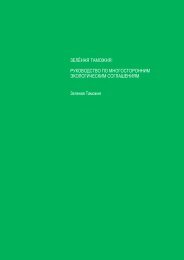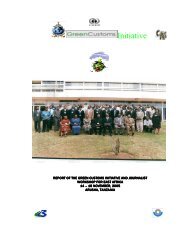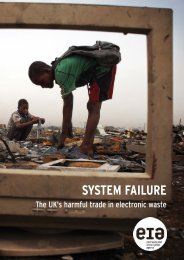Bhutan - Green Customs Initiative
Bhutan - Green Customs Initiative
Bhutan - Green Customs Initiative
Create successful ePaper yourself
Turn your PDF publications into a flip-book with our unique Google optimized e-Paper software.
2005 SUB-REGIONAL<br />
GREEN CUSTOMS INITIATIVE<br />
WORKSHOP<br />
THIMPHU, BHUTAN<br />
29 OCTOBER – 1 NOVEMBER 2005<br />
ORGANIZED BY<br />
UNITED NATIONS ENVIRONMENT PROGRAMME,<br />
REGIONAL OFFICE FOR ASIA AND THE PACIFIC (UNEP/ROAP):<br />
Division of Technology, Industry and Economics (DTIE),<br />
Division of Environmental Conventions (DEC),<br />
Division of Regional Coordination (DRC) and the Regional Offices &<br />
Division of Environmental Policy Implementation (DEPI)<br />
IN COOPERATION WITH<br />
National Environment & Commission,<br />
Department of Revenue & <strong>Customs</strong>,<br />
The Royal Government of <strong>Bhutan</strong>
CONTENTS<br />
1 BACKGROUND.........................................................................................................3<br />
2 OBJECTIVES OF THE WORKSHOP..............................................................................4<br />
3 PARTNERS...............................................................................................................5<br />
4 METHODOLOGY ......................................................................................................5<br />
5 PARTICIPANTS.........................................................................................................6<br />
6 EXPECTED OUTCOME..............................................................................................6<br />
7 KEY ISSUES CONCLUDED........................................................................................7<br />
8 RECOMMENDATIONS EMERGING FROM THE QUESTIONNAIRES ................................8<br />
ANNEX 1: AGENDA ......................................................................................................10<br />
ANNEX 2: EVALUATION BY PARTICIPANTS...................................................................16<br />
ANNEX 3: LIST OF PARTICIPANTS.................................................................................19<br />
2
1 BACKGROUND<br />
Environmental crime is a big and increasingly lucrative business – a multi-billion<br />
dollar global enterprise. Illegal international trade in “environmentally-sensitive”<br />
commodities such as Ozone Depleting Substances (ODSs), toxic chemicals,<br />
hazardous wastes and endangered species is an international problem with serious<br />
consequences: it directly threatens human health and the environment, contributes to<br />
species loss, and results in revenue loss for governments.<br />
Another serious effect of illegal trade in environmentally sensitive commodities is<br />
that it also seriously undermines the effectiveness of Multilateral Environmental<br />
Agreements (MEAs) by circumventing rules and procedures agreed in international<br />
treaties.<br />
National and international regimes for integrated chemical management rely on<br />
customs to monitor and control flows of regulated chemicals at borders 1 .<br />
International agreements related to chemical management often restrict the national<br />
supply and demand of specific chemicals and some set incentives for phase out of the<br />
most harmful substances. If illegal trade in these chemicals occurs, the incentives set<br />
by the MEAs for control and phase out of chemicals are considerably weakened. In<br />
those countries, which have the appropriate laws or policies already in place, the<br />
national customs authorities must have the capacity to monitor and control the flow of<br />
chemicals and goods covered by MEAs.<br />
However, customs agencies operating in isolation are not sufficient. At the national<br />
level, customs is but one element of a “compliance and enforcement chain” that<br />
includes:<br />
Clear and enforceable legislation,<br />
Authority equipped with an institutional set up (skilled experts in this field)<br />
for MEA implementation,<br />
Monitoring detection and seizure of illegal shipments by customs agencies,<br />
Prosecution of criminal cases involving such shipments by prosecuting<br />
attorneys,<br />
Appropriate sentencing by the judiciary.<br />
Stakeholders will face difficulties in phasing out their consumption of<br />
environmentally sensitive commodities, without;<br />
Enacting of enforceable legislations,<br />
Competent authorities who update them about obligations of MEAs and<br />
provide customs authorities with proper technical and policy advice,<br />
Effective detection and seizure by customs,<br />
Deterrent punishment to those who have attempted to abuse the legislations.<br />
All five individual links in this chain must be strong in order to achieve our goal of<br />
phasing out consumption of environmentally sensitive commodities and to succeed as<br />
a whole. In many developing countries these key players suffer from either weakness<br />
1 This also applies to international regimes protecting endangered species.<br />
3
or lack linkages amongst themselves (for example; without enacting enforceable<br />
legislations, lack of training of customs officers, legal advisors etc.). As a result this<br />
encourages illegal trade that is difficult to control, which in turn makes it difficult to<br />
be in compliance with these MEAs.<br />
The <strong>Green</strong> <strong>Customs</strong> <strong>Initiative</strong> aims at strengthening compliance and enforcement of<br />
MEAs through integrated capacity building for customs officers within the MEA<br />
enforcement chain. It plans to provide customs officers with training that covers<br />
several MEAs at the same time, making it more efficient than separate training on<br />
individual agreements.<br />
2 OBJECTIVES OF THE WORKSHOP<br />
The main aim of this meeting, organized by UNEP (ROAP, DTIE & DEC), and<br />
OPCW was to gather the key stakeholders (customs officers, customs training<br />
institutes, MEA national focal points, judges, prosecutors) of MEAs from 8 countries<br />
in the Asia region to enable them to familiarize themselves with the MEAs (Montreal<br />
Protocol, Rotterdam, Stockholm, Basel and CITES) and discuss face-to-face the<br />
concerned issues, as well as to identify the role of each stakeholder in order to<br />
facilitate achieving compliance with the relevant MEAs.<br />
The workshop thus aimed at:<br />
Creating awareness amongst customs officers on their role in enforcing<br />
MEAs<br />
Presenting the trade aspects of each of these MEAs and the impact on<br />
customs officers<br />
Presenting the existing international setting for MEA enforcement (including<br />
MEA secretariats)<br />
Highlighting interlinkages and possible synergies in enforcement of the<br />
various MEAs<br />
Encouraging bilateral and regional dialogues on trade practices related to<br />
MEAs<br />
Presenting available resources for customs administration on MEA<br />
enforcement issues, particularly amongst international organizations<br />
involved in these issues<br />
Testing the <strong>Green</strong> <strong>Customs</strong> Manual being developed by the partners so that<br />
it can be adapted to the training needs of the national customs administration<br />
Encouraging creation of links at the national level between key MEA<br />
enforcement stakeholders: customs officers, customs training institutes,<br />
MEA national focal points, judges, prosecutors<br />
Discussing possibilities and relevance of expanding the training to focus also<br />
on judges and prosecutors in the next phase of work<br />
Preparing a second phase in which the generic training manual will be<br />
adapted to national training needs.<br />
4
3 PARTNERS<br />
International Partners<br />
The following international organizations co-operated in the preparation of the<br />
workshop:<br />
Chemical Weapons Convention (OPCW)<br />
The World <strong>Customs</strong> Organization (WCO)<br />
Secretariats of the following MEAs:<br />
o Rotterdam Convention on the Prior Informed Consent Procedure for<br />
certain hazardous chemicals and pesticides in international trade.<br />
o Convention on International Trade in Endangered Species of Wild<br />
Flora and Fauna (CITES)<br />
U.S. Department of State<br />
Divisions of the United Nations Environment Programme<br />
Regional Partners<br />
o Regional Office for Asia and the Pacific (UNEP ROAP):<br />
o Division of Technology, Industry and Economics (UNEP DTIE)<br />
o Division of Environmental Conventions (UNEP DEC)<br />
The following regional organizations co-operated in the preparation of the workshop:<br />
WCO Asia Pacific Regional Office for Capacity Building (ROCB)<br />
IUCN Country Office Nepal<br />
Interpol Asia<br />
Asia-Pacific Regional Centre for Hazardous Waste Management Training<br />
and Technology Transfer (Basel Convention Regional Centre in China)<br />
National Partners<br />
The following national agencies co-operated in the preparation of the workshop:<br />
National Environment & Commission, The Royal Government of <strong>Bhutan</strong><br />
Department of Revenue & <strong>Customs</strong>, The Royal Government of <strong>Bhutan</strong><br />
4 METHODOLOGY<br />
The meeting was organized over a period of four days in order to give enough time<br />
for all concerned to express their experiences, visions and accomplishments, to<br />
discuss with relevant secretariats and agencies, future action plans and also facilitate<br />
the enforcement of regional legislations relevant to MEAs, as well as to curb illegal<br />
trade on a regional level by cooperating with relevant authorities and organizations.<br />
5
In order to achieve these objectives, the meeting followed the agenda previously<br />
prepared by the Compliance Assistance Programme (CAP) of ROAP in consultation<br />
with all resource persons (Annex 1).<br />
All presentations and related documents addressed during the meeting were<br />
distributed to the participants in both hard copy and soft copy format.<br />
Alls participants, including resource persons were requested to fill in an evaluation<br />
questionnaire on the proceedings of the workshop and the usefulness of the <strong>Green</strong><br />
<strong>Customs</strong> Training Manual.<br />
Local media, including television and newspapers, covered the meeting.<br />
5 PARTICIPANTS<br />
The meeting was inaugurated under the patronage of H. E. Wangdi Norbu, Minister,<br />
Ministry of Finance, Royal Government of <strong>Bhutan</strong>. The opening ceremony was<br />
attended by high-level officials of the National Environment Commission and the<br />
Department of Revenue & <strong>Customs</strong> and welcome notes given by Mr. Sonam Yangley,<br />
Director, National Environment Commission, the Royal Government of <strong>Bhutan</strong> and<br />
Mr. Rajendra Shende, Head Ozone Action Programme, Division of Technology,<br />
Industry and Economics, United Nations Environment Programme.<br />
Eight countries in the Asia Region participated in the workshop: Bangladesh, <strong>Bhutan</strong>,<br />
China, India, Indonesia, Nepal, Sri Lanka and Thailand. Each country was requested<br />
to nominate three participants, one law or environmental officer from the<br />
Environment Department and 2 representatives from the <strong>Customs</strong> Department,<br />
preferably with one officer working at the Airport and another officer working at the<br />
Border. For <strong>Bhutan</strong>, two additional participants being a Prosecutor and a Judge were<br />
invited to the workshop. <strong>Bhutan</strong> also sent several observers from National<br />
Environment Commission and Department of Revenue & <strong>Customs</strong>.<br />
Resource persons came from the relevant organizations, including the Chemical<br />
Weapons Convention (OPCW), World <strong>Customs</strong> Organization (WCO), WCO Asia<br />
Pacific Regional Office for Capacity Building (ROCB), Basel Convention Regional<br />
Centre in China, Interpol Asia, IUCN Nepal, and U.S. Department of State – in<br />
addition to UNEP.<br />
6 EXPECTED OUTCOME<br />
The workshop aimed at achieving the following:<br />
Training of customs officers and other national stakeholders leading to a<br />
greater awareness of MEA issues, available resources and contacts at<br />
national and international levels.<br />
Synergies created between international, regional and national stakeholders<br />
(especially customs) on the implementation of trade regulations of MEAs<br />
Bilateral, sub-regional and regional dialogues created on combating illegal<br />
trade in environmentally-sensitive commodities<br />
Feedback received on <strong>Green</strong> <strong>Customs</strong> Manual and integrated for a final<br />
result, which could be adapted to national needs.<br />
6
7 KEY ISSUES CONCLUDED<br />
Following were the conclusions of the workshop based on the discussions in the<br />
working groups, and following the presentations.<br />
Cooperation: should be promoted both at the national and regional level:<br />
National Cooperation<br />
o Between national government agencies<br />
o Clustering of some Conventions when drafting Laws / Regulations<br />
may be considered<br />
o Need for high level political awareness, at Ministerial level and<br />
Parliamentarians<br />
Regional Cooperation<br />
o The ongoing regional coordination between ozone officers and<br />
customs officers in the South Asia and SEAP regional enforcement<br />
network as part of a Swedish bilateral project under the Multilateral<br />
Fund of the Montreal protocol is a good example that could be<br />
extended to include other MEAs. It includes a <strong>Customs</strong> officers<br />
network, exchange of information, and cooperation during<br />
investigation with colleagues in the Region<br />
o The Lusaka Agreement (CITES) is a good example of the Regional<br />
implementation in Africa of the CITES Convention. Similar<br />
Agreements in the Region and integration could be considered<br />
o Work with the Coalition against Wildlife Trafficking<br />
o INECE recently started a Regional network started in SEA/SA<br />
Cooperation with International Organisations<br />
o Making use the tools made available by WCO (HS codes); WCO<br />
RILO AP (CEN / environmental goods project) and Interpol<br />
(Ecomessage)<br />
o Such co-operation works both ways. National use of tools indicates<br />
importance of environmental crime to the Organisation, which may<br />
aim at increasing resources<br />
Training: is vital for ensuring that all stakeholders can fully exercise control<br />
Covering the full enforcement chain<br />
o Include in and coordinate with existing programmes, e.g. the UNEP<br />
Judges <strong>Initiative</strong><br />
o The Government of Nepal & IUCN proposed a national training<br />
programme for <strong>Customs</strong>, Judges, and Law Officers for 2006<br />
Regional Centres of Excellence<br />
7
o WCO Regional Training Centers could include a <strong>Green</strong> <strong>Customs</strong><br />
training module into their curriculum<br />
Immediate follow-up on the workshop: it is important for participants to followup<br />
on the training received when going back to the country<br />
Country Participants<br />
o Inform your colleagues: Discuss how it affects your work, what tools<br />
are missing to perform<br />
o Transfer the message to the central administration, including the tools<br />
you need<br />
o Use the materials in national training: <strong>Green</strong> <strong>Customs</strong> Partners can<br />
assist you in adapting the training materials to your national needs<br />
o Develop Case studies: Smuggling techniques, lessons learned, best<br />
practices<br />
o Before we meet again: Inform us on how to use existing mechanisms<br />
such as CEN, CAP, …, communicate with the <strong>Green</strong> <strong>Customs</strong><br />
<strong>Initiative</strong> for improvements, ask Questions and give suggestions<br />
Organisers<br />
o<br />
Raise awareness within the customs region<br />
o Improve the training materials<br />
o Identify Regional Centres of Excellence to make <strong>Green</strong> <strong>Customs</strong><br />
sustainable at national level<br />
o Improve tools (e.g. HS codes matrix, <strong>Customs</strong> Quick Tool, website, e-<br />
learning…)<br />
o Improve cooperation between partners<br />
o Avoid duplication in activities<br />
8 RECOMMENDATIONS EMERGING FROM THE QUESTIONNAIRES<br />
The evaluation questionnaires allowed room for participants to make suggestions for<br />
improvement. A summary of recommendations:<br />
1. Laboratory personnel working in the customs department and/or other<br />
research institutions should be included as participants in <strong>Green</strong> <strong>Customs</strong><br />
Workshops.<br />
2. More information such as a list of manufacturers of ODS, non-ODS and more<br />
information about chemicals covered by the MEAs should be added to the<br />
<strong>Green</strong> <strong>Customs</strong> training manual to familiarize customs officers without a<br />
scientific background with the substances under control.<br />
3. Encourage the establishment of a practical linkage between environment<br />
officers and customs officers, linkage and coordination with MEAs<br />
4. Establishment of a focal point in each country and for each MEA to facilitate<br />
exchange of information.<br />
8
5. Implementation of a pilot project.<br />
6. Create a follow-up communication system between local authorities and MEA<br />
secretariats.<br />
7. The Bio-safety agreement should be included in the <strong>Green</strong> <strong>Customs</strong> <strong>Initiative</strong>.<br />
8. HS codes for every chemical being under control by any MEA should be<br />
included in the <strong>Green</strong> <strong>Customs</strong> Training Manual.<br />
9. A long-term programme should be implemented to support the concept of<br />
<strong>Green</strong> <strong>Customs</strong>.<br />
10. Capacity building of customs should take into account the situation in Asian<br />
Countries.<br />
11. Include reference articles names, sources, useful website and court decisions<br />
in the <strong>Green</strong> <strong>Customs</strong> Training Manual.<br />
12. Cases studies and role-playing activities should be applied in the workshop.<br />
13. More training to law enforcement officer, legal frame work for environmental<br />
protection, should be included in future work-programmes.<br />
14. Implementation of environmental cases convergence of conventions.<br />
15. Training material should be supplied 1 or 2 weeks earlier for pre-reading /<br />
studying.<br />
16. More time should be provided for the working group session.<br />
9
ANNEX 1: AGENDA<br />
Agenda<br />
<strong>Green</strong> <strong>Customs</strong> Workshop<br />
29 October – 1 November, Thimphu, <strong>Bhutan</strong><br />
18.00 – 18.30<br />
18:00 – 19:00<br />
Friday 28 October 2005<br />
Briefing for Session Chairs<br />
Registration of Participants<br />
Saturday 29 October 2005<br />
Inaugural Session<br />
08:45 – 09.45<br />
OPENING OF THE REGIONAL WORKSHOP<br />
Master of Ceremony: Mr. Ritu Raj, <strong>Bhutan</strong><br />
Traditional <strong>Bhutan</strong> Ceremony<br />
Welcome Address<br />
Mr. Sonam Yangley, Director National Environment Commission (NEC)<br />
Opening remarks<br />
Mr. Rajendra Shende, Chief, OzonAction Programme, UNEP<br />
Address by the Chief Guest, <strong>Bhutan</strong><br />
H.E. Wangdi Norbu, Minister, Ministry of Finance, <strong>Bhutan</strong><br />
09.45 – 10.45 Briefing of the Media<br />
10.45 – 11:00 Introduction of Participants<br />
Session 1<br />
11:00 – 12:00<br />
TEA / COFFEE BREAK<br />
Showing of video: Combating the Illegal Trade in Ozone Depleting<br />
Substance: A Guide for Enforcement Officers<br />
INTRODUCTION TO THE GREEN CUSTOMS INITIATIVE<br />
Chaired by Mr. Sonam Dorji, <strong>Bhutan</strong><br />
Objectives and Approach of the Workshop<br />
Ms. Ludgarde Coppens, Policy & Enforcement Officer, UNEP-ROAP<br />
<strong>Green</strong> <strong>Customs</strong>: Coordinated Method of Capacity Building<br />
Mr. Rajendra Shende, UNEP<br />
Q&A – Discussion<br />
12.00 – 13.30 LUNCH BREAK<br />
10
Session 2<br />
13.30 – 15.00<br />
Country presentation by Bangladesh (10 Minutes)<br />
COMPLIANCE WITH AND ENFORCEMENT OF MEAs<br />
Chaired by Ms. Ludgarde Coppens, UNEP<br />
Overview of the UNEP guidelines and manual on compliance with and<br />
enforcement of MEAs<br />
Mr. Carl Bruch, Legal Officer, UNEP<br />
Status of Ratification,<br />
Paper with status of ratification will be circulated<br />
Q&A - Discussion<br />
A round table discussion by the countries on their most pressing issues in terms<br />
of implementation of legislation, difficulty to adopt a legislation, enforcement<br />
and illegal trade, with focus on common elements in different MEAs.<br />
15.00 – 15.30 TEA / COFFEE BREAK<br />
Session 3<br />
15:30 – 16:30<br />
Session 4<br />
16:30 – 18:00<br />
18: 00 – 19:30<br />
Country presentation by India (10 minutes)<br />
THE ROLE OF WCO IN ENFORCEMENT OF MEAs<br />
Chaired by Mr. Subhash C. Varshney, India<br />
Harmonized System – Recommendations<br />
Major amendments to the HS from 1 January 2007 (Environmental<br />
goods)<br />
Mr. Izaak Wind, Deputy Director, Tariff and Trade Affairs, WCO<br />
The role of the Regional Office for Capacity Building of WCO in the<br />
Region<br />
Ms. Yoko Odashima, Technical Attaché, WCO Asia Pacific Regional Office for<br />
Capacity Building (ROCB)<br />
Q&A – Discussion<br />
CROSS-CUTTING ISSUES IN COMPLIANCE AND ENFORCEMENT OF<br />
MEAs<br />
Country presentation by Nepal (10 minutes)<br />
Chaired by Mr. Rajendra Shende, UNEP<br />
National legislation and Licensing systems, Enforcement of national<br />
Legislation, Identification and Interdiction<br />
Mr. Lawrence I. Sperling, Senior Adviser, U.S. Department of State<br />
Q&A – Discussion<br />
Reception hosted by UNEP<br />
11
Sunday 30 October 2005<br />
Session 5<br />
09.00 – 10.15<br />
Country presentation by China (10 minutes)<br />
COMPLIANCE WITH AND ENFORCEMENT OF SPECIFIC MEAs<br />
Chaired by Mr. Izaak Wind, WCO<br />
Basel Convention on Trans-boundary Movement of Hazardous Wastes<br />
Mr. Liu Hao, Basel Convention Regional Centre, China<br />
Q&A – Discussion<br />
10.15 – 10.45 TEA / COFFEE BREAK<br />
Session 6<br />
10.45 – 12.00<br />
Country presentation by Indonesia (10 minutes)<br />
COMPLIANCE WITH AND ENFORCEMENT OF SPECIFIC MEAs<br />
Chaired by Mr. Hu Tian Shu China<br />
Montreal Protocol on ozone depleting substances<br />
Ms. Ludgarde Coppens, UNEP<br />
Q&A – Discussion<br />
12.00 – 13.00 LUNCH BREAK<br />
Session 7<br />
13.30 – 15.00<br />
Country presentation by Thailand (10 minutes)<br />
COMPLIANCE WITH AND ENFORCEMENT OF SPECIFIC MEAs<br />
Chaired by Mr. Tharaka Seneviratne, Sri Lanka<br />
Overview of the Rotterdam Convention<br />
Ms. Ludgarde Coppens, UNEP<br />
Q&A – Discussion<br />
15:00 – 15.30 TEA / COFFEE BREAK<br />
Session 8<br />
15:30 – 16:30<br />
Country presentation by <strong>Bhutan</strong> (10 minutes)<br />
COMPLIANCE WITH AND ENFORCEMENT OF SPECIFIC MEAs<br />
Chaired by Mr. Tharaka Seneviratne, Sri Lanka<br />
Stockholm Convention<br />
Mr. Lawrence I. Sperling, Senior Adviser, U.S. Department of State<br />
Q&A – Discussion<br />
12
Monday 31 October 2005<br />
Session 9<br />
09.00 – 10.15<br />
Country presentation by Sri Lanka (10 minutes)<br />
COMPLIANCE WITH AND ENFORCEMENT OF SPECIFIC MEAs<br />
Chaired by Rezaul Hasan, Bangladesh<br />
Introduction to the Convention on International Trade in Endangered<br />
Species of Wild Fauna and Flora (CITES)<br />
Mr. Carl Bruch, UNEP and Mr. Narayan Belbase, IUCN, Nepal<br />
Q&A – Discussion<br />
10.15 – 10.45 TEA / COFFEE BREAK<br />
Session 10<br />
10:45 – 12:00<br />
ROLE OF INTERPOL IN IMPLEMENTATION AND ENFORCEMENT OF<br />
MEAS<br />
Chaired by Mr. Madhu Sudan Bhattarai, Nepal<br />
Environmental Crimes – Practical Guide on Cooperation with Interpol<br />
Mr. Ho Wai Hong, Interpol<br />
Q&A – Discussion<br />
12.00 – 13.30 LUNCH BREAK<br />
Session 11<br />
13.30 – 15.00<br />
REGIONAL & NATIONAL PERSPECTIVES ON CUSTOMS ISSUES<br />
Working Group Sessions<br />
Question 1. Legislative Framework Development, Enforcement and<br />
Compliance and approaches towards addressing needs identified<br />
(Facilitators: IUCN and US Department of State)<br />
Question 2. Data collection, analysis, reporting, detection, establishment of<br />
line/chain control, and approaches towards addressing needs identified<br />
(Facilitators: WCO, Interpol, OPCW)<br />
Question 3. <strong>Green</strong> <strong>Customs</strong> Training: synergies among the Basel,<br />
Rotterdam and Stockholm Conventions, CITES, and the Montreal Protocol<br />
(Facilitators: BCRC, UNEP-DEC,WCO-ROCB)<br />
15:00 – 15.30 TEA / COFFEE BREAK<br />
Session 12<br />
15:30 – 17:00<br />
FEEDBACK SESSION<br />
Chaired by Mr. Carl Bruch, UNEP<br />
Reporting back of discussions in the small working groups<br />
Feedback on <strong>Green</strong> <strong>Customs</strong> Training Approach and Training Manual –<br />
discussion<br />
18:30 - Dinner hosted by the Department of Revenue and <strong>Customs</strong>, <strong>Bhutan</strong><br />
13
Tuesday 1 November2005<br />
Session 13<br />
09:00 – 10:15<br />
THE CHEMICAL WEAPONS CONVENTION (CWC)<br />
Chaired by Mr. Kanis Isdul, Thailand<br />
Introduction to the Chemical Weapons Convention<br />
Mr. Carlos Trentadue, Organization for the Prohibition of Chemical Weapons<br />
Q&A – Discussion<br />
10.15 – 10.45 TEA / COFFEE BREAK<br />
10:45 – 12:00 Chaired by Mr. Kanis Isdul, Thailand<br />
<strong>Customs</strong> Training on the Chemical Weapons Convention<br />
Mr. Carlos Trentadue, Organization for the Prohibition of Chemical Weapons<br />
Q&A – Discussion<br />
Regional and national perspectives of the Chemical Weapons Convention<br />
– role and functions of <strong>Customs</strong> Officers<br />
Mr. Carlos Trentadue, Organization for the Prohibition of Chemical Weapons<br />
Q&A – Discussion<br />
12.00 – 13.30 LUNCH BREAK<br />
13:30 – 15:00 Chaired by Mr. Kanis Isdul, Thailand<br />
Implementation and enforcement of the Chemical Weapons Convention<br />
and linkages with other MEAs – lessons learned<br />
Mr. Carlos Trentadue, Organization for the Prohibition of Chemical<br />
Weapons<br />
15:00 – 15.30 Hrs TEA / COFFEE BREAK<br />
Session 14<br />
15.30 – 16.30<br />
CONCLUSIONS OF THE REGIONAL GREEN CUSTOMS TRAINING<br />
WORKSHOP<br />
Summary and Recommendations from the Workshop<br />
Mr. Rajendra Shende, UNEP<br />
Mr. Carlos Trentadue, Organization for the Prohibition of Chemical Weapons<br />
Q&A – Discussion<br />
14
Closing Session<br />
16:30 – 17:00<br />
CONCLUSIONS OF THE REGIONAL GREEN CUSTOMS TRAINING<br />
WORKSHOP<br />
Master of Ceremony:<br />
Closing remarks<br />
UNEP<br />
Mr. Carl Bruch, UNEP<br />
WCO<br />
Mr. Izaak Wind ,World <strong>Customs</strong> Organization<br />
OPCW<br />
Mr. Carlos Trentadue, Organization for the Prohibition of Chemical Weapons<br />
Government of <strong>Bhutan</strong><br />
Mr. Ritu Raj Chhetri, Senior Legal Officer, <strong>Bhutan</strong><br />
19:00 - Dinner hosted by National Environment Commission, <strong>Bhutan</strong><br />
15
ANNEX 2: EVALUATION BY PARTICIPANTS<br />
<br />
<br />
<br />
<br />
<br />
<br />
<br />
<br />
Fig 1: Percentage of participants<br />
The total number of participants who completed the evaluation questionnaire is 24<br />
persons, including 12 customs officers, 5 environment officers, 3 law officers, 1<br />
prosecutor and 3 partners & resource persons.<br />
<br />
<br />
<br />
*+<br />
#,)<br />
-,.<br />
/ ')'<br />
<br />
<br />
<br />
!"# $ % &'<br />
<br />
#()<br />
<br />
Fig 2: Participant’s experience with Multilateral Environmental Agreements<br />
Prior to the workshop, most of participants knew about the Multilateral<br />
Environmental Agreements covered in the <strong>Green</strong> <strong>Customs</strong> <strong>Initiative</strong>. All participants<br />
knew about CITES and only a few had never heard about Montreal Protocol, Basel<br />
Convention, Rotterdam Convention and Stockholm Convention.<br />
16
Fig 3 : (question no 5 : Overall, how do you think this training guide fulfils the<br />
function <br />
<br />
+<br />
(a) As background<br />
document for this<br />
workshop.<br />
<br />
<br />
<br />
,)<br />
+<br />
<br />
16 participants found that the<br />
training guide as background<br />
document of this workshop<br />
very useful, 7 useful and 1<br />
somewhat useful.<br />
<br />
<br />
0<br />
+<br />
<br />
,)<br />
+<br />
<br />
(b) As general introduction<br />
of the MEAs<br />
14 participants found that<br />
the general introduction of<br />
the MEAs is very useful, 8<br />
useful and 2 somewhat<br />
useful.<br />
<br />
+<br />
(c) As a tool to assist in day<br />
–to-day work.<br />
0<br />
<br />
<br />
,)<br />
+<br />
<br />
10 participants found that<br />
the training guide is very<br />
useful as a tool to assist in<br />
day-to-day work, 12 useful,<br />
1 somewhat useful and<br />
another one found that it is<br />
not very useful.<br />
17
Responses to questions in the questionnaire are summarized as below:<br />
Question 1. Would you consider that there is too much information or not enough<br />
in formation in this training guide<br />
Answer: 68% found that the information is sufficient, 18% felt that it is too much and<br />
14% needed more information.<br />
Question 2. Please indicate three things that you will remember from the training<br />
guide.<br />
Answer: Major things the participants will remember from the training are guidance,<br />
practical aspects of implementation of MEAs, convergence of conventions, role of<br />
customs authority in implementation of MEAs, legislation for enforcement<br />
obligations under the protocol and cooperation & coordination required for execution<br />
of MEAs.<br />
Question 3. What section was the most useful to you<br />
Answer: 22 % of participants considered CITES as the most useful section, 17% for<br />
Montreal Protocol and 61% for the other Conventions including role of Interpol.<br />
Question 4. What section (if any) would you expand and which (if any) would you<br />
reduce<br />
Answer: 17 % of participants requested that the CITES section should be expanded,<br />
13% for Stockholm Convention and 9% for Rotterdam Convention. Also the working<br />
group session should also be expanded. There is no major comment on the reduction<br />
of any section.<br />
Question 5. Overall, how do you think this training guide fulfils the function<br />
Answer: Fig. 3<br />
Question 6. Do you have any cases or examples relating to implementation of any<br />
of these MEAs from your experience, which could usefully be included in the training<br />
Guide Would you like to provide it for inclusion of the guide<br />
Answer: 3 of the legal officers/prosecutors experienced cases or examples, 2 of the<br />
environment officers and only one customs officer know of such cases. Of those<br />
responding positively, only half were prepared to provide the cases for inclusion in<br />
the guide.<br />
Question 7. What other tools do you think would complement this training guide,<br />
and why<br />
Answer: some suggestions were made as follows<br />
Include all MEAs related to chemicals in one guide book<br />
Example of case study, report, database for training for update and access<br />
Practical guidance for customs officer<br />
National guidance, information and legislation<br />
Interpreter for the workshop<br />
Question 8. Is the CD-Rom a useful complement<br />
Answer: All participants found that CD-Rom useful. Participants required more<br />
specific information on CITES, Basel Convention and Rotterdam Convention. They<br />
also required some specific information for other sections as well.<br />
18
ANNEX 3: LIST OF PARTICIPANTS<br />
COUNTRY<br />
BANGLADESH<br />
BHUTAN<br />
NAME AND ADDRESS<br />
Dr. Satyendra Kumar Purkayastha<br />
Senior Officer, Ozone Cell<br />
Department of Environment<br />
Ministry of Environment and Forests<br />
Tel: 880 2 912 4005 Fax: 880 2 911 8682 / 912 4005<br />
Mobile: 880 0 1730 13310<br />
Email: Purkayastha@doe-bd.org<br />
Mr. Rezaul Hasan<br />
Commissioner of <strong>Customs</strong><br />
Office of the Commissioner<br />
Custom, Excise and VAT,<br />
Bhola Tank Road, Jessore, Bangladesh<br />
Tel: 880 4 216 8434 Fax: 880 4 216 5405<br />
Mobile: 880 171 810840<br />
Mr. Ritu Raj Chhetri<br />
Senior Legal Officer and Ozone Officer<br />
National Environment Commission Secretariat<br />
P.O. Box 466, Thimphu, <strong>Bhutan</strong><br />
Tel: 975 2 323 384 Fax: 975 2 323385<br />
Mob: 975 1 7608472<br />
Email: drukritu@hotmail.com<br />
Mr. Tashi Gyalpo<br />
Prosecutor<br />
Office of Legal Affairs, Thimphu, <strong>Bhutan</strong><br />
Tel : 975 2 326 886 Fax : 975 2 324 606<br />
Email tsaqye@yahoo.com<br />
Mr. Kinley Namgay<br />
Assistant Judge<br />
High Court, Thimphu, <strong>Bhutan</strong><br />
Tel : 975 2 322 344, Mobile 17622567<br />
Email: kinnams@hotmail.com<br />
Mr. Wangchuk Thayey<br />
<strong>Customs</strong> Enforcement Section (HQs)<br />
Department of Revenue and <strong>Customs</strong><br />
Ministry of Finance, Thimphu<br />
Tel: 975 2 322319/324357 Fax: 975 2 323608<br />
Mobile : 975 1762 3369<br />
Email: wangthayey@yahoo.co.uk<br />
Mr. Chewang Jamcho<br />
Assistant Collector (Border <strong>Customs</strong>)<br />
<strong>Customs</strong> Enforcement Section (HQs)<br />
Department of Revenue and <strong>Customs</strong><br />
Ministry of Finance, Thimphu<br />
Tel: 975 2 322319/324357 Fax: 975 2 323608<br />
Mobile: 975176205242<br />
Email: chews2002@yahoo.com<br />
19
BHUTAN<br />
Ms. Yeshey Seldon<br />
Assistant Collector (<strong>Customs</strong> Airport)<br />
<strong>Customs</strong> Enforcement Section (HQs)<br />
Department of Revenue and <strong>Customs</strong><br />
Ministry of Finance, Thimphu<br />
Tel: 975 2 322319/324357 Fax: 975 2 323608<br />
Mobile : 975 17627015<br />
Email: yeshey_seldon@yahoo.com<br />
Mr. S.P. Pradhan<br />
Head of Training Centre<br />
DPC, Thimphu<br />
Tel: 975 2 328390 Fax: 975 2 328391<br />
Email: sppradhan@mof.gov.bt<br />
Mr. Tenzin Khorlo<br />
Assistant Director and Focal Point of Chemical Conventions<br />
National Environment Commission, P.O. Box no. 466<br />
Tel : 975 2 323384, 324323 Fax : 975 2 323385<br />
Mobile : 975 17607641<br />
Email : tkhorlo@nec.gov.bt<br />
CHINA<br />
Mr. H.B. Gurung<br />
Joint Director<br />
Head of <strong>Customs</strong> & Excise<br />
Department of Revenue & <strong>Customs</strong><br />
Thimphu, <strong>Bhutan</strong><br />
Tel: 975 2 324357, 322319 Fax: 975 17607631<br />
Email: gurung@mof.gov.bt<br />
Ms. Ma Qi<br />
Division Director<br />
Foreign Economic Cooperation Office (FECO)<br />
State Environmental Protection Administration (SEPA)<br />
No. 115, Nanxiaojie, Xizhimennei, Beijing 100035,China<br />
Tel: 86 10 6655 6590 Fax: 86 10 6655 6591<br />
Mobile : 86 136 0121 1062<br />
E-mail: ma.qi@sepafeco.org.cn<br />
Mr. Hu Tian Shu<br />
Deputy Director General<br />
Capital Airport <strong>Customs</strong><br />
Tel: 86 10 65395727 Fax. 86 10 65395727<br />
Mobile : 86 139 1100 1800<br />
Email: Hutianshu@sina.com<br />
INDIA<br />
Mr. Tan Jun<br />
Deputy Division Director<br />
Anti-Smuggling Bureau<br />
General Administration of <strong>Customs</strong><br />
Tel 86 10 65195789 Fax. 86 10 65195789<br />
Mobile 86 138 0103 6495<br />
Email: Tanjun@<strong>Customs</strong>.gov.cn<br />
Mr. Subba Rao Medarametla<br />
Additional Director<br />
Ministry of Environment & Forests<br />
Room No. 927, Paryavaran Bhawan, CGO Complex Lodhi Road, New<br />
Delhi-3, India<br />
Tel & Fax : 91 11 2436 1410<br />
Mobile : 981 056 8103<br />
Email: wowsubbarao@yahoo.co.in<br />
20
INDIA<br />
INDONESIA<br />
Mr. Subhash C. Varshney<br />
Additional Director General<br />
National Academy of <strong>Customs</strong> Excise and Narcotics,<br />
Sector 29 Faridabad, India<br />
Tel: 91 129 2504636, 2504613 Fax: 91 129 2504611, 2504615<br />
Mobile: 91 981 1774729<br />
Email: adgnacen@gmail.com<br />
Mr. A.P. Varma<br />
Additional Director General<br />
National Academy of <strong>Customs</strong> Excise and Narcotics,<br />
Bhandup (E), Mumbai 400042<br />
Tel: 91 22 25680981 Fax. 91 22 25683591<br />
Email: varma1950@yahoo.co.in, adgnacen@gmail.com<br />
Ms. Astutie Widyarissantie<br />
Technical Staff of Atmosphere Protection Division<br />
Assistant Deputy for Climate Change Impact Control<br />
Ministry of Environment of Republic of Indonesia<br />
Tel: 62 21 8517164 Fax. 62 21 85902521<br />
Mobile : 62 856 789 6369<br />
Email: santie@menlh.go.id, astutie@yahoo.com<br />
Mr. Bernadus Sutjipto<br />
Head Section of Prevention and Investigation<br />
<strong>Customs</strong> Service Office – Ngurah Rai – Bali<br />
Directorate for Prevention and Investigation of <strong>Customs</strong> and Excise Office<br />
Ministry of Finance, Indonesia<br />
Tel: 62 21 489 0308 Fax: 62 21 489 7928<br />
Mob: 62 813 3864 1567<br />
Email : bernardus_ok@yahoo.co.id<br />
NEPAL<br />
Mr. Cerah Bangun<br />
Head Section of Prevention and Investigation<br />
<strong>Customs</strong> Service Office – Belawan – North Sumatra<br />
Directorate for Prevention and Investigation of <strong>Customs</strong> and Excise Office<br />
Ministry of Finance, Indonesia<br />
Tel: 62 61 6940227 Fax: 62 81 61946776<br />
Mobile: 62 81 161 7667<br />
Email: cerahbangun@centrin.net.id<br />
Mr. Gokul Prasad Burlakoti<br />
Legal Officer (Under Secretary)<br />
Ministry of Environment, Science and Technology<br />
Kathmandu, Nepal<br />
Tel: 977 1 4225660 Fax: 977 1 422 5474<br />
Email: gokulburakoti@hotmail.com<br />
Dr. Kanti Shrestha<br />
Scientific Officer<br />
Royal Nepal Academy of Science and Technology (RONAST)<br />
Latitpur, Nepal<br />
Tel: 977 1 5547714<br />
Email : ozone@ntc.net.np<br />
Dr. Sita Ram Joshi<br />
Deputy Director General<br />
Nepal Bureau of Standards and Metrology<br />
P.O. Box 985, Balaju, Kathmandu, Nepal<br />
Tel: 977 14 356 672, 4350 818, 4356810 Fax: 977 14 350 689<br />
Email: ozone@ntc.net.np or nbsm@nbsm.gov.np<br />
21
NEPAL<br />
SRI LANKA<br />
Mr. Madhu Sudan Bhattarai<br />
Chief <strong>Customs</strong> Administrator of Tribhuvan Airport <strong>Customs</strong><br />
Napal Nagapokhari Kathmandu, Nepal<br />
Tel: 977 44 34450 Fax. 977 1 447 4426<br />
Mobile: 984 1 333 642<br />
Ms. Lumbini Kiriella<br />
Legal Officer<br />
Ministry of Environment and Natural Resources<br />
No. 82 Sampath Paya Battaramulla<br />
Tel: 94 11 2877284 Fax. 94 11 2877284<br />
Mobile: 094 77 6923318<br />
Email: kiriella@menr.lk<br />
Mr. R.M.C.B Ratnayake<br />
Assistant Superintendent of <strong>Customs</strong><br />
<strong>Customs</strong> Department<br />
Tel: 94 11 2445148 Fax. 94 11 2430691<br />
Mobile : 072 323 7829, 0947 2 3237829<br />
Email: chethiya@customs.gov.lk<br />
THAILAND<br />
Mr. R P D Tharaka Seneviratne<br />
Deputy Director of <strong>Customs</strong><br />
<strong>Customs</strong> Department, Bristol street, Colombo, Sri Lanka<br />
Tel: 94 11 2342505 Fax. 94 11 232 3458<br />
Mobile: 0777 439 751<br />
Email: tharas30@hotmail.com<br />
Mr. Soodsakorn Putho<br />
Director, Treaties and International Strategies Bureau<br />
Department of Industrial Works<br />
Ministry of Industry<br />
75/6 Rama VI Road, Rajthewi District, Bangkok 10400, Thailand<br />
Tel: 662 202 4228, 662 202 4210 Fax: 662 202 4015<br />
Mobile: 669 813 6152<br />
E-mail: soodsakorn@diw.go.th<br />
Mr. Kreecha Kirdsriphan<br />
Chief of Land Enforcement Sub-Division,<br />
Suppression and Investigation Bureau<br />
<strong>Customs</strong> Department<br />
Bangkok, Thailand<br />
Tel: 662 672 7567 Fax. 662-671 7994<br />
Mobile: 661 819 5678<br />
Email: k_kreecha@hotmail.com<br />
UNEP ROAP<br />
Regional Office for Asia and<br />
the Pacific<br />
2nd Floor, United Nations<br />
Building<br />
Rajdamnern Nok Avenue,<br />
Bangkok 10200<br />
Thailand<br />
Mr. Kanis Isdul<br />
Chief of Passenger Control Sub-Division<br />
Bangkok International Airport Bureau<br />
<strong>Customs</strong> Department<br />
Tel: 662 535 1257 Fax. 662 535 5045<br />
Email: kaniscust@yahoo.com<br />
Ms. Ludgarde Coppens<br />
Policy and Enforcement Officer<br />
Tel: 66 2 288 1679 Fax: 66 2 280 3829<br />
Mobile: 669 012 2148<br />
Email: coppensl@un.org<br />
Ms. Sasithorn Liammukda<br />
United Nation Environment Programme<br />
Tel: 66 2 288 2621 Fax: 66 2 280 3829<br />
Email: liammugda@un.org<br />
22
UNEP DTIE<br />
UNEP DEC<br />
Chemical Weapons<br />
Convention (OPCW)<br />
World <strong>Customs</strong> Organization<br />
WCO Asia Pacific Regional<br />
Office for Capacity Building<br />
(ROCB)<br />
Basel Convention Regional<br />
Centre China<br />
Interpol<br />
U.S. Department of State<br />
IUCN<br />
Mr. Shende Rajendra<br />
Head Ozone Action Programme<br />
Division of Technology, Industry and Economics<br />
United Nations Environment Programme (UNEP)<br />
Tour Mirabeau, 39-43 Quai Andre Citroen<br />
75739 Paris Cedex 15, FRANCE<br />
Tel: 33 1 4437 1459 Fax: 33 1 4437 1474<br />
Email: rmshende@unep.fr<br />
Mr. Carl Bruch<br />
Legal Officer<br />
1707 H Street NW, Suite 300, Washington, DC 20006, USA<br />
Tel: +1 202 974 1303 Fax: +1 202 785 2096<br />
Email: carl.bruch@rona.unep.org<br />
Mr. Carlos Hugo Trentadue<br />
Head of Declarations Branch<br />
OPCW, The Hague, Netherlands<br />
Tel: 31 70 416 3015 Fax: 31 70 306 3535<br />
Mobile: 31 06 5180 2311<br />
Email deb@opcw.org, ctrentadue@opcw.org<br />
Mr. Izaak Wind<br />
Deputy Director<br />
Tariff and Trade affairs Directorate<br />
World <strong>Customs</strong> Organization<br />
Tel. 32 2 209 92 52 Fax 32 2 209 94 92<br />
Email: Izaak.Wind@wcoomd.org<br />
Ms. Yoko Odashima<br />
Technical Attache<br />
c/o Thai <strong>Customs</strong> Department<br />
Sunthornkosa Rd, Khlong Toey, Bangkok 10110<br />
Tel: 66 (0) 2 667 7384 Fax: 66 (0) 2 671 7293<br />
Mobile: 664 713 1280<br />
Email: odashima@rocbap.org<br />
Mr. Liu Hao<br />
Asia-Pacific Regional Centre for Hazardous Waste Management Training<br />
and Technology Transfer<br />
Tel. 8610-62794351 Fax. 8610-62772048<br />
Emails: bcrc@tsinghua.edu.cn<br />
Mr. Wai Hong Albert Ho<br />
Regional Specialize Officer<br />
Room 914, 9/F New Building, Royal Thai Police<br />
Rama 1 Road, Patumwan, Bangkok 10330, Thailand<br />
Tel: 66 22 54 5231 Fax: 66 22 53 3927<br />
Email: hwhalbert@interpolasia.org, hwh1965@yahoo.com.hk<br />
Mr. Lawrence I. Sperling<br />
Senior Adviser<br />
Office of Policy Coordination and <strong>Initiative</strong>s<br />
Bureau of Oceans and International Environmental and Scientific Affairs<br />
U.S. Department of State<br />
2201 C St. NW, Washington, DC 20520<br />
Tel: 202-647-2061 Fax: 202-647-6876<br />
Email sperlingli@state.gov<br />
Mr. Narayan Belbase<br />
Coordinator<br />
IUCN Country Office Nepal<br />
P.O. Box 3923, Kathmandu, Nepal<br />
Tel: 977 1 552 6391, 552 8781 Fax: 977 1 553 6786<br />
Mobile: 98510 71238<br />
Email: narayan@iucn.org.np<br />
23


